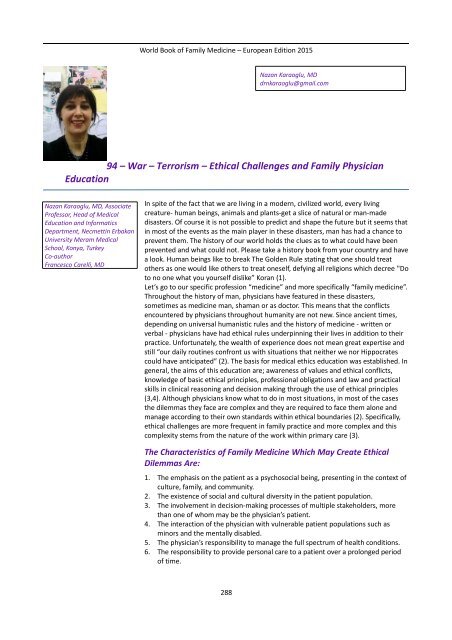Family Medicine
World Book 2015
World Book 2015
Create successful ePaper yourself
Turn your PDF publications into a flip-book with our unique Google optimized e-Paper software.
World Book of <strong>Family</strong> <strong>Medicine</strong> – European Edition 2015<br />
Nazan Karaoglu, MD<br />
drnkaraoglu@gmail.com<br />
94 – War – Terrorism – Ethical Challenges and <strong>Family</strong> Physician<br />
Education<br />
Nazan Karaoglu, MD, Associate<br />
Professor, Head of Medical<br />
Education and Informatics<br />
Department, Necmettin Erbakan<br />
University Meram Medical<br />
School, Konya, Turkey<br />
Co-author<br />
Francesco Carelli, MD<br />
In spite of the fact that we are living in a modern, civilized world, every living<br />
creature- human beings, animals and plants-get a slice of natural or man-made<br />
disasters. Of course it is not possible to predict and shape the future but it seems that<br />
in most of the events as the main player in these disasters, man has had a chance to<br />
prevent them. The history of our world holds the clues as to what could have been<br />
prevented and what could not. Please take a history book from your country and have<br />
a look. Human beings like to break The Golden Rule stating that one should treat<br />
others as one would like others to treat oneself, defying all religions which decree "Do<br />
to no one what you yourself dislike” Koran (1).<br />
Let’s go to our specific profession “medicine” and more specifically “family medicine”.<br />
Throughout the history of man, physicians have featured in these disasters,<br />
sometimes as medicine man, shaman or as doctor. This means that the conflicts<br />
encountered by physicians throughout humanity are not new. Since ancient times,<br />
depending on universal humanistic rules and the history of medicine - written or<br />
verbal - physicians have had ethical rules underpinning their lives in addition to their<br />
practice. Unfortunately, the wealth of experience does not mean great expertise and<br />
still “our daily routines confront us with situations that neither we nor Hippocrates<br />
could have anticipated” (2). The basis for medical ethics education was established. In<br />
general, the aims of this education are; awareness of values and ethical conflicts,<br />
knowledge of basic ethical principles, professional obligations and law and practical<br />
skills in clinical reasoning and decision making through the use of ethical principles<br />
(3,4). Although physicians know what to do in most situations, in most of the cases<br />
the dilemmas they face are complex and they are required to face them alone and<br />
manage according to their own standards within ethical boundaries (2). Specifically,<br />
ethical challenges are more frequent in family practice and more complex and this<br />
complexity stems from the nature of the work within primary care (3).<br />
The Characteristics of <strong>Family</strong> <strong>Medicine</strong> Which May Create Ethical<br />
Dilemmas Are:<br />
1. The emphasis on the patient as a psychosocial being, presenting in the context of<br />
culture, family, and community.<br />
2. The existence of social and cultural diversity in the patient population.<br />
3. The involvement in decision-making processes of multiple stakeholders, more<br />
than one of whom may be the physician’s patient.<br />
4. The interaction of the physician with vulnerable patient populations such as<br />
minors and the mentally disabled.<br />
5. The physician’s responsibility to manage the full spectrum of health conditions.<br />
6. The responsibility to provide personal care to a patient over a prolonged period<br />
of time.<br />
288


